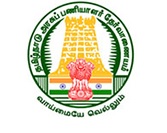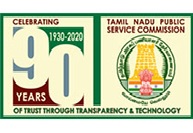TNPSC Home Science Exam Syllabus : Tamil Nadu Public Service Commission
Organisation : Tamil Nadu Public Service Commission (TNPSC)
Exam Name : TNPSC Home Science Examination
Standard : UG Degree Standard
Subject Code : 341
Announcement : TNPSC Home Science Exam Syllabus
Website : https://www.tnpsc.gov.in/English/new_syllabus.html
TNPSC Home Science Exam Syllabus
TNPSC Home Science Exam Syllabus are given below,
Related / Similar Syllabus : TNPSC Mariculture Exam Syllabus

UNIT-I: Food Science & Technology
Composition, nutritive value , changes during cooking of various foods – cereals, legumes, vegetables, fruits, milk and milk products, flesh foods- egg, fish and meat, fats and oils and sugars. Importance of fermented foods, use of enzymes in food industry, genetically modified foods and organic foods.
UNIT- II: Human Nutrition
Energy- Unit, Determination of Total energy requirements, Energy balance. Carbohydrate, Fat and Protein in Human Nutrition- Sources, Classification, Functions, digestion , absorption, utilization and metabolism. Significance of dietary fiber, glycemic index, protein quality. Health effects of saturated and unsaturated fatty acids. Vitamins and Minerals in Human Nutrition- Sources, functions and deficiencies and excess of Fat soluble vitamins, Water soluble vitamins, Macro minerals, Microminerals and Trace elements. Significance of antioxidants in human nutrition.
UNIT – III: Normal & Therapeutic Nutrition
Physiological changes affecting nutrient needs during pregnancy, lactation, infancy upto old age. Recommended Dietary allowances and meal planning. Nutritional concerns in pregnancy, infancy, early childhood, school going children, adolescents, adults and old age Therapeutic Nutrition- Etiology, symptoms, clinical features and dietary modifications for Fevers, Obesity, Gastrointestinal diseases, Diabetes Mellitus, Renal diseases, Cardiovascular diseases, Cancer and Inborn errors of metabolism.
UNIT- IV: Food Microbiology & Food Safety
Contamination and spoilage of plant and animal foods, food borne infection and intoxication. Safe handling of food. Methods of Food Preservation. Food Adulteration- nature of adulterants, method of evaluation of adulterants. Food safety- quality analysis, application of HACCP in food safety. Role of national and international agencies in food safety.
UNIT- V: Institution & Entrepreneurship Management
Principles and functions of management, tools of management –organization chart, Job Description, Job Specification and work Schedule. Personnel Management- recruitment, selection and training of employees. Financial management- Elements of cost, costcontrol and pricing. Labour laws related to employees – industrial dispute Act, factories Act, minimum wages Act, shops and establishments Act. Entrepreneur – Definition – Qualities and skills – Functions of an entrepreneur – Motivational and discouraging factors of entrepreneurship. Problems and constraints faced by women entrepreneurs. Assistance by Institutions for entrepreneurs – SSI and SISI, SIDCO. ITCOT, SIPCOT. NABARD and IDBI.
UNIT- VI: Public Health Nutrition
Etiology, clinical features and preventive strategies for Under nutrition – PEM, anaemia, Vitamin A deficiency, Iodine deficiency disorders. Overnutrition – Obesity, Diabetes and Cardiovascular diseases. Nutrition Intervention programmes- ICDS, Mid day meal programme. Role of National and International Organizations in Health Care. Nutritional Assessment- Anthropometric, Biochemical, Clinical, Diet Survey, Biophysical Methods, Functional Indices and Vital Statistics. Nutrition education- Objectives, Principles and Methods.
UNIT- VII: Human Development & Family Dynamics
Pre natal development characteristics of physical, motor, social, cognitive, language and emotional development from infancy to old age. Childhood ailments, characteristics and problems of adolescents, adulthood and the aged. Family- Types of family and family structure in India. Characteristics and functions of the family. Stages and adjustments in family life cycle. Individual roles, rights and responsibilities within the family. Critical family situation. Marriage- motives of marriage, factors influencing marital adjustments. Sex education.
UNIT – VIII: Textiles & Fabrics
Art and design in textiles – ancient and modern. Methods of printing- Hand printing- Block, Stencil, batik, tie and dye. Machine printing- Roller printing, screen printing.Dyes- classification. Fabric Construction- weaving, types of weaves. Fabric finishes- basic and special finishes. Care and maintenance of garments.
UNIT- IX: Consumer & The Market
Definition, rights and responsibilities of consumer. Types and functions of market, buying practices, buying aids- branding, labeling and packaging. Problems of the consumer. Consumer organizations, consumer redressal, laws for consumer protection, consumer education- need, objectives and methods.

UNIT- X: Research Methodology
Objectives and types of research, selection of research problems. Research ethics. Research Design- types, Sampling methods, Tools of data collection, pilot study. Processing of data- coding, classification, editing. Presentation, interpretation and report writing.
Download Syllabus
TNPSC Home Science Exam Syllabus Link:
http://www.syllabus.gen.in/uploads/pdf2022/2922-syllabus.pdf